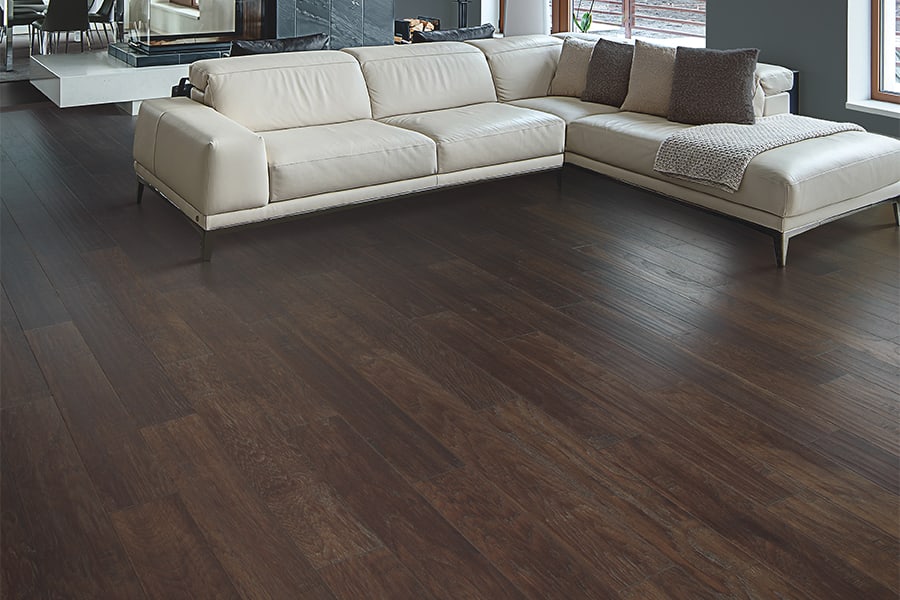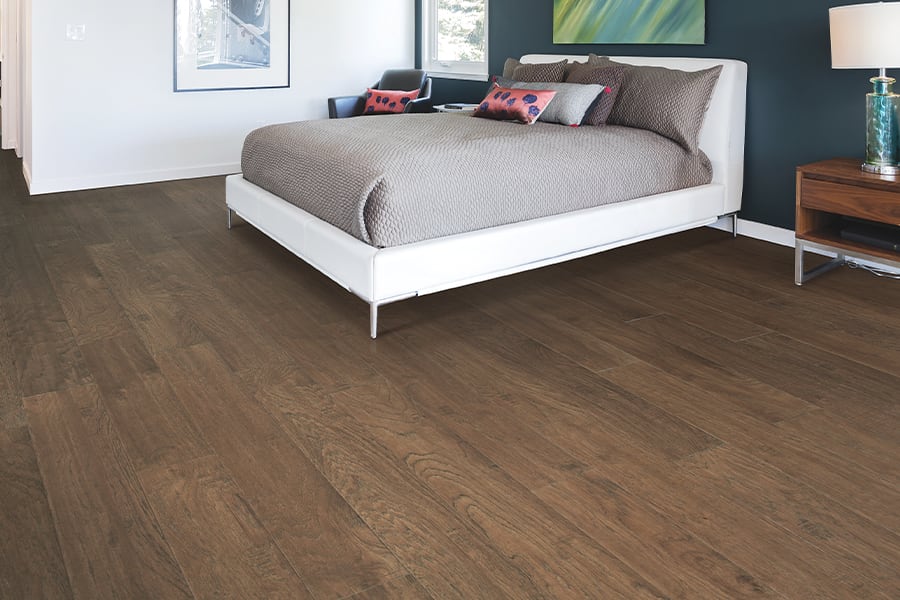Hardwood flooring: elegance meets durability
Step into a world of timeless beauty with hardwood flooring. Hardwood is revered for its classic charm and inherent strength and is not just a flooring choice; it's a statement of style. Whether you’re renovating an old space or setting the tone for a new one, hardwood flooring promises a blend of elegance and longevity that few other flooring options can match.
Solid wood vs. engineered wood flooring
Understanding the nuances of hardwood flooring starts with differentiating between its two main types: solid wood and engineered wood.
- Solid wood flooring: Solid hardwood flooring is crafted from a single piece of lumber and is the traditional form of hardwood. It can be sanded and refinished multiple times, allowing homeowners to change or renew their floors' appearance. While solid wood's durability is commendable, it is sensitive to moisture and humidity changes and might not be the best choice for areas like basements or over concrete subfloors.
- Engineered wood flooring: This type consists of multiple layers of wood, with the topmost layer being the actual hardwood veneer. Engineered wood offers more resistance to moisture and can be installed in a wider range of settings, including basements. Although it can still be sanded and refinished, the number of times is generally fewer than solid wood.
Request a free consultation
Benefits of wood floors
When it comes to choosing hardwood flooring, the advantages are manifold:
Hardwood needs to be installed on a level floor, which means that proper prep work needs to be done to make sure it doesn’t float over the baseboards. This includes sanding and leveling of the subfloor prior to hardwood installation. It also involves evening out the moisture levels in the subfloor and the new wood floor.
Hardwood needs to be properly acclimated to its environment before it is installed to prevent warping. Di’s Floor Centre drops hardwood off at a customer’s home one week to 10 days before we install it so that the moisture levels even out between the new and existing wood. They must be no more than 3% different in moisture levels, otherwise, it will be detrimental to the floor.
Because less prep work is required to mechanically fasten or glue engineered hardwood flooring down to the subfloor, it is less expensive to install than solid hardwood. But, as for all flooring, there are other factors to consider.
Solid hardwood is usually three-quarters of an inch thick, which means you could refinish it two to three, or even four times over its lifetime. That’s 50-60 years of solid hardwood flooring for your home without any replacement costs. Engineered hardwood is not as thick, so you will only likely be able to refinish it once before your flooring needs to be replaced.
- Timeless appeal: Hardwood floors boast a beauty that never goes out of style. With many species, stains, and finishes available, they can match any decor.
- Durability: With proper care, wood floors can last a lifetime. Their resilience against daily wear and tear makes them a favorite for households with pets and children.
- Enhanced air quality: Unlike carpets that trap dust, allergens, and particles, wood floors don't harbor these contaminants, promoting a healthier indoor environment.
- Value addition: Installing hardwood flooring can increase property value, making it a wise investment for homeowners.
- Easy maintenance: Regular sweeping and occasional mopping are all it takes to keep hardwood floors shining. They resist spills and stains, and in case of minor damages, spot repairs are feasible.
Hardwood is sensitive to moisture, which is why we acclimate it prior to installation
Hardwood needs to be installed on a level floor, which means that proper prep work needs to be done to make sure it doesn’t float over the baseboards. This includes sanding and leveling of the subfloor prior to hardwood installation. It also involves evening out the moisture levels in the subfloor and the new wood floor.
Hardwood needs to be properly acclimated to its environment before it is installed to prevent warping. Di’s Floor Centre drops hardwood off at a customer’s home one week to 10 days before we install it so that the moisture levels even out between the new and existing wood. They must be no more than 3% different in moisture levels, otherwise, it will be detrimental to the floor.
What about the expense? Why solid hardwood is still a great investment
Because less prep work is required to mechanically fasten or glue engineered hardwood flooring down to the subfloor, it is less expensive to install than solid hardwood. But, as for all flooring, there are other factors to consider.
Solid hardwood is usually three-quarters of an inch thick, which means you could refinish it two to three, or even four times over its lifetime. That’s 50-60 years of solid hardwood flooring for your home without any replacement costs. Engineered hardwood is not as thick, so you will only likely be able to refinish it once before your flooring needs to be replaced.
Acclimating hardwood floors
Before diving into the installation process, acclimating your hardwood flooring is a crucial step. Here’s why and how:
Hardwood flooring features superior construction techniques and some of the highest quality finishes in the flooring industry. Its beauty and elegance add value to any home. At Di’s Floor Centre, we offer prefinished solid hardwood and engineered hardwood.
Simple to maintain. Many modern hardwood finishes make upkeep and cleaning easy.
Adds resale value to your home. Hardwood floors are attractive to homebuyers in every market and can help increase the return on your home investment.
Provides a natural look that other flooring options cannot. Laminate and vinyl flooring do a great job simulating hardwood floors, but when it comes down to it, there is nothing like the real thing. All-natural earthy textures and unique knots and lines are a feature that only hardwood can give you.
Straightforward installation.
All flooring solutions at Di’s Floor Centre have a green certification and have low or no VOC emissions. We also offer hypoallergenic and all-natural products for customers who experience allergies or chemical sensitivities.
Wood flooring, whether it is engineered or solid, is a great foundation for style and function in any room, and a wonderful investment for your future. The type of hardwood you buy (whether it is solid or engineered) depends on where it will go.
Solid wood and engineered wood have different installation methods, as well as different costs:
Let’s say you’d like to remodel your basement, and you want to have a hardwood floor installed. It’s not impossible, but there are some things to keep in mind.
Because the basement is underground, more moisture will seep up through the basement concrete than a regular slab at ground level. For this reason, you would use engineered hardwood flooring instead of solid hardwood. Why?
Solid hardwood needs to be mechanically fastened or glued to a base floor to keep it from warping, which would not be advisable with so much moisture in the mix. Engineered hardwood, on the other hand, does not, so it’s more stable for basement applications.
- Why acclimate? Wood is a natural material, and like all things organic, it responds to its environment. Depending on humidity and temperature, wood can expand or contract. Acclimating ensures the hardwood flooring adjusts to its new home's conditions, reducing post-installation issues like buckling or gaps.
- How to acclimate: Upon receiving hardwood planks, they should be placed in the room they will be installed in, unboxed, and spread out. Allow them to sit for at least 48 to 72 hours. This period can vary based on the specific wood type and environmental conditions. Using a moisture meter can help determine when the wood has balanced with the room's moisture levels.
Hardwood flooring features superior construction techniques and some of the highest quality finishes in the flooring industry. Its beauty and elegance add value to any home. At Di’s Floor Centre, we offer prefinished solid hardwood and engineered hardwood.
Benefits
Simple to maintain. Many modern hardwood finishes make upkeep and cleaning easy.
Adds resale value to your home. Hardwood floors are attractive to homebuyers in every market and can help increase the return on your home investment.
Provides a natural look that other flooring options cannot. Laminate and vinyl flooring do a great job simulating hardwood floors, but when it comes down to it, there is nothing like the real thing. All-natural earthy textures and unique knots and lines are a feature that only hardwood can give you.
Straightforward installation.
All flooring solutions at Di’s Floor Centre have a green certification and have low or no VOC emissions. We also offer hypoallergenic and all-natural products for customers who experience allergies or chemical sensitivities.
Things to think about…
Wood flooring, whether it is engineered or solid, is a great foundation for style and function in any room, and a wonderful investment for your future. The type of hardwood you buy (whether it is solid or engineered) depends on where it will go.
Solid vs. Engineered Hardwood:
Solid wood and engineered wood have different installation methods, as well as different costs:
Let’s say you’d like to remodel your basement, and you want to have a hardwood floor installed. It’s not impossible, but there are some things to keep in mind.
Engineered Hardwood
Because the basement is underground, more moisture will seep up through the basement concrete than a regular slab at ground level. For this reason, you would use engineered hardwood flooring instead of solid hardwood. Why?
Solid Hardwood
Solid hardwood needs to be mechanically fastened or glued to a base floor to keep it from warping, which would not be advisable with so much moisture in the mix. Engineered hardwood, on the other hand, does not, so it’s more stable for basement applications.

Get the look
Hardwood flooring is a truly unique flooring solution. The natural characteristics of hardwood add depth to your décor and an aesthetic look that many other types of floors can only try to duplicate. Hardwood adds warmth and character to your home with warm and cool tones, and it works well in any interior design from rustic to modern styles.
Visit us for high-quality hardwood flooring
Embracing hardwood flooring is embracing a legacy of elegance. With clear distinctions between solid and engineered wood and an array of benefits, wood flooring is a testament to style and substance. Ensure you invest time in acclimating your hardwood for a perfect finish and relish the beauty it brings to your space for years to come.
Di's Carpet is here for your flooring solutions. Our showrooms in Cottage Grove, OR, and Springfield, OR, serve Springfield, OR, Eugene, OR, Cottage grove, OR, Creswell, OR, and Pleasant hill, OR. Call today!
Di's Carpet is here for your flooring solutions. Our showrooms in Cottage Grove, OR, and Springfield, OR, serve Springfield, OR, Eugene, OR, Cottage grove, OR, Creswell, OR, and Pleasant hill, OR. Call today!













